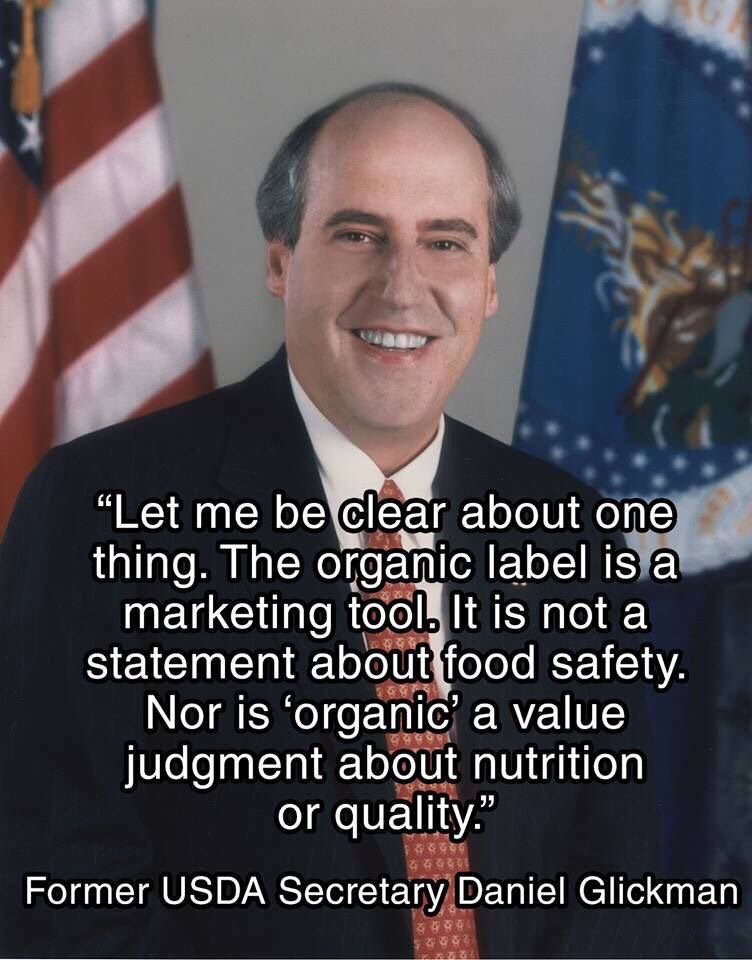this post was submitted on 03 Nov 2023
290 points (94.5% liked)
Anarchist Memes
1182 readers
1 users here now
This forum is for anarchists to circlejerk and share zesty memes
founded 5 years ago
MODERATORS
you are viewing a single comment's thread
view the rest of the comments
view the rest of the comments

The USDA hosting info on the program on the Agricultural Marketing Service site seems a bit on-the-nose for the quote, and I had trouble finding anything useful on that site (not sure if it's an awful site or I'm just tired), but I did finally find a link to the actual regulations defining USDA Organic and the National List of Allowed and Prohibited Substances for organic production.
The quote is correct in that USDA Organic doesn't distinguish organic produce from conventional in terms of safety, nutrition, or quality. It does distinguish from conventional in a lot of other ways, like land management, GMO being unavailable, and extra announced and unannounced inspections for compliance. I'd be curious to see an environmental impact assessment on organic production vs conventional, and a comparison of the types and associated risks of pesticide residues found on organic/conventional crops: those are the two things that are usually brought up when discussion organic crops. There's a fair bit more to it than I thought. Definitely not just a "marketing tool", though it is definitely that too.
I did see a study a while back specifically on GMO vs non-GMO crops and the non-GMO crops wound up being much worse for the environment because they require far more land and water to get an equivalent yeild. But that study didn't factor in all the other things that go along with organic vs nonorganic farming.
I also have no idea how I would find that study again and I'm far too tired/lazy to use my google fu right now so I don't have anything to back that up with other than "trust me bro".
But when it comes to personal anecdote I have personally seen that there is a huge difference even between conventional farming methods. My grandfather rents out a bunch of farmland on his property but he enforces certain healthier farming methods such as requiring crop rotations, restrictions on the fertilizers and other chemicals used, and forbidding the growing of certain more intensive crops. It isn't quite organic farming but it's much more restrictive than most large scale farming. He wants to keep the land healthy because he also actually lives on that land. Meanwhile his brother owns farmland across the road which he also rents out but imposes no restrictions on the farming practices used so the renter there just grows corn every year and fertilizes the piss out of it so that it actually grows. My grandfathers farmland is perfectly healthy even when just left fallow. Meanwhile his brothers land is a dusty barren washed out hellscape where nothing really grows even when left fallow. It's a striking difference just between the two sides of the road.
It actually really annoys me that gmo is somehow seen as a universally bad thing when it's really not very different from sped up selective breeding, and could do so much to help the environment and even increase animal welfare (what if there were GMO cows that don't need to have their babies stolen to get milk from them).
But my only options are to either ignore any ethical production issues entirely or completely avoid GMO food.
GMO is kind of a red herring. It is often done to allow plants to survive Round Up, which had recently been shown to have toxic effects. There's also compelling evidence that many people who think they can't tolerate gluten actually can't tolerate Round Up.
The genetic modification isn't intrinsically a problem, but the chemicals that plants need to be modified to tolerate are.
Our household has gone organic and we make most of our food from scratch because of health reasons (allergies). Personally speaking, there are lots of foods that claim to be organic that aren't, which is a problem. But I would suggest you trying organic milk, veggies and fruits before you decide. It is extremely apparent in the quality of those things. I hate organic beef, have no idea why. It might be that supplier, it might be the grass they eat because I'm allergic to grass, who knows. Just like anything else, it's a matter of trust because yes, they do check but not that much. I would stay away from pasta and canned foods made in countries with loose regulations that are called organic (trader joes) because it might be okay but it might not too. It's unfortunately just like everything, the greeds trying to scam.
As far as environment, I disagree. The land needs less pesticides because they are killing our bees, our ecosystem and causing all kinds of health problems in everyone. We also need to eat less as Americans and supplement our food with homegrown which would bring more nature to backyards and rooftops. That would be better for the environment.
I'm not going to fight about this, look to the EU for pesticide laws and organic laws. Like Ireland just makes organic butter and doesn't need to call it that, it's just food. Last comment.